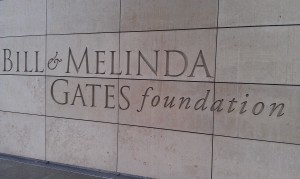Politicians and the media have retrained their sights on the Koch brothers’ political influence, but a look at some numbers suggests they should investigate other billionaires—such as Bill Gates.
The New York Times recently highlighted a Democratic offensive against Koch brothers David and Charles for $30 million they sent Americans for Prosperity (AFP) to buy TV ads to influence key Senate races: “They’re spending millions of dollars to try to buy a United States Senate seat,” complained targeted North Carolina Sen. Kay Hagan. The Washington Post in January claimed a wild figure of $407 million spent by a “Koch-backed political coalition” in the 2012 election cycle, although the same article also had to sheepishly admit, far below the lead, “It is unclear how much of the network’s funds came directly from the Kochs.”
As other people have pointed out, $30 million is chump change compared to, say, labor union spending. In fact, the alleged $400 million is only about equal to union spending in 2012. How does that sum compare with another politically minded billionaire, such as Gates?
It’s not even a contest. Koch foundations have given $4.7 million to AFP since 1998, according to leftist group SourceWatch. Koch Industries has spent a grand total of $18 million in politics since 1989, says the Wall Street Journal. In contrast, the Gates Foundation has given just Planned Parenthood, both in the U.S. and abroad, more than $70 million.
The Gates Foundation is the world’s largest, at $37 billion in assets, according to its tax filings. That number alone makes it far, far larger than any single or cumulative Koch gift. Some may argue Gates spends money on philanthropy, not politics, but Gates actually has perfected the practice of using nonprofit organizations to influence politics. Leftists claim to hate this tactic—witness the manufactured rage and proposed IRS regulations aiming to curb politics-minded conservative nonprofit organizations—but it seems they actually just hate the tactic when it’s used against them.
Michigan State University political scientist Sarah Reckhow calls Gates-style funding “the shadow bureaucracy.” Scott Thomas, dean of Claremont University’s education school, also has studied Gates’ activity. He calls it “advocacy philanthropy.”
The Gates Foundation is “jumping into the policy process itself,” Thomas told me last year. Its activities “look a lot like lobbying.”
For a case study, consider education policy, where Gates dominates the nation. Gates has directly funded the U.S. Department of Education and state departments of education, from Delaware to Kentucky to Washington and beyond. The foundation also has bankrolled an initiative driving most of education policy, period: Common Core, which alters pre-K through graduate school, teacher training, teacher promotion and job security, local and state tax bills for testing technology, and more. To date, Gates has spent $242 million on Common Core by my calculation, including all the original grants to foster its creation. Of that, $147 million, or more than half, is for direct advocacy, through funding of myriad teacher outreach efforts, support for various trade groups including Chambers of Commerce to influence state and federal lawmakers, and grants to military coalitions and Jeb Bush’s Foundation for Excellence in Education.
“The Gates Foundation’s agenda has become the country’s agenda in education,” Michael Petrilli of the Thomas B. Fordham Institute said in 2009 after five Gates employees moved to the Obama administration. Two joined the U.S. Department of Education and had to get Obama administration waivers from its conflict of interest policy banning lobbyists from becoming high-ranking federal employees. A few months later, Gates offered states money to write proposals for the Obama administration’s Race to the Top grants from a stimulus slush fund—butonly for states that had committed to the still-unwritten Common Core.
A basic comparison like this suggests that, if it really cares about big money in politics, the media should drop its Koch feeding frenzy and move on to bigger fish like Gates. But since Gates is a self-declared Democrat who favors government intervention on the pretext of climate change and funds the nation’s biggest abortion provider, that’s not likely.
Joy Pullmann is an education research fellow at The Heartland Institute and a 2013-14 Robert Novak journalism fellow.





